一般现在时态讲解与练习
- 格式:doc
- 大小:92.00 KB
- 文档页数:22
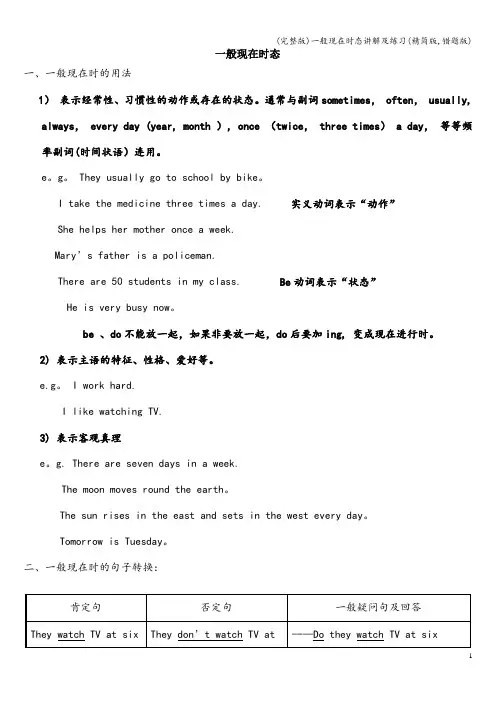
一般现在时态一、一般现在时的用法1)表示经常性、习惯性的动作或存在的状态。
通常与副词sometimes, often, usually, always, every day (year, month ), once (twice, three times) a day,等等频率副词(时间状语)连用。
e。
g。
They usually go to school by bike。
I take the medicine three times a day. 实义动词表示“动作”She helps her mother once a week.Mary’s father is a policeman.There are 50 students in my class. Be动词表示“状态”He is very busy now。
be 、do不能放一起,如果非要放一起,do后要加ing, 变成现在进行时。
2) 表示主语的特征、性格、爱好等。
e.g。
I work hard.I like watching TV.3) 表示客观真理e。
g. There are seven days in a week.The moon moves round the earth。
The sun rises in the east and sets in the west every day。
Tomorrow is Tuesday。
二、一般现在时的句子转换:三、一般现在时的结构:“主语+谓语+其它”,有时为了起强调作用,时间状语也可提前.三单变化:1)多数在动词后+s :play - plays like —likes ask———asks work———works get---gets stay-——stays2)以字母s, x, ch, sh或o结尾的动词,+-es:watch-——watches wish———wishes fix———fixes do——-d oes go---goes pass-—-passes3)以“辅音字母加 - y”结尾的动词,要先变y为i+-es。
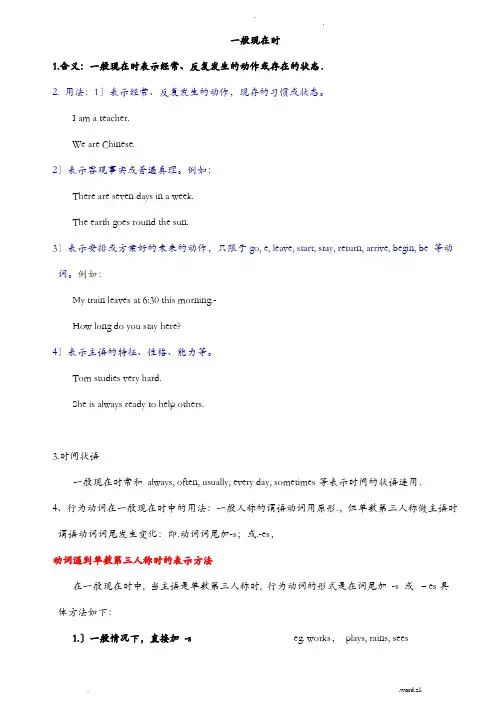
一般现在时1.含义:一般现在时表示经常、反复发生的动作或存在的状态.2. 用法:1〕表示经常、反复发生的动作,现存的习惯或状态。
I am a teacher.We are Chinese.2〕表示客观事实或普遍真理。
例如:There are seven days in a week.The earth goes round the sun.3〕表示安排或方案好的未来的动作,只限于go, e, leave, start, stay, return, arrive, begin, be 等动词。
例如:My train leaves at 6:30 this morning.-How long do you stay here?4〕表示主语的特征、性格、能力等。
Tom studies very hard.She is always ready to help others.3.时间状语一般现在时常和always, often, usually, every day, sometimes等表示时间的状语连用.4、行为动词在一般现在时中的用法:一般人称的谓语动词用原形.,但单数第三人称做主语时谓语动词词尾发生变化:即.动词词尾加-s;或.-es,动词遇到单数第三人称时的表示方法在一般现在时中, 当主语是单数第三人称时, 行为动词的形式是在词尾加-s 或–es具体方法如下:1.〕一般情况下,直接加-s eg. works,plays, rains, sees2.〕以sh, ch, s, x 或o 结尾的词后加–eseg. washes, teaches, fixes, does, goes3〕.以辅音字母加-y 结尾的,先把‘y’ 改成‘i’,再加-eseg. studies, flies, carries注意: 动词加-s 以后的读音.1.在[p] [t] [k] [f] 等清辅音后,发清辅音/s/eg. helps , works, likes, hates ,laughs2.在浊辅音和元音后,发浊辅音/z/eg. drives, cleans, plays3.在[s] [z] [∫ ] [] []后,发/iz/rises, wishes, teaches, urges4.在[t] [d]后,发/ts/ /dz/eg. fits, sets, needs5. 其他情况下发[z]eg. plans, cries, shows5.否认形式:主语是第三人称单数,在行为动词前加doesn’t. 行为动词变为原形。
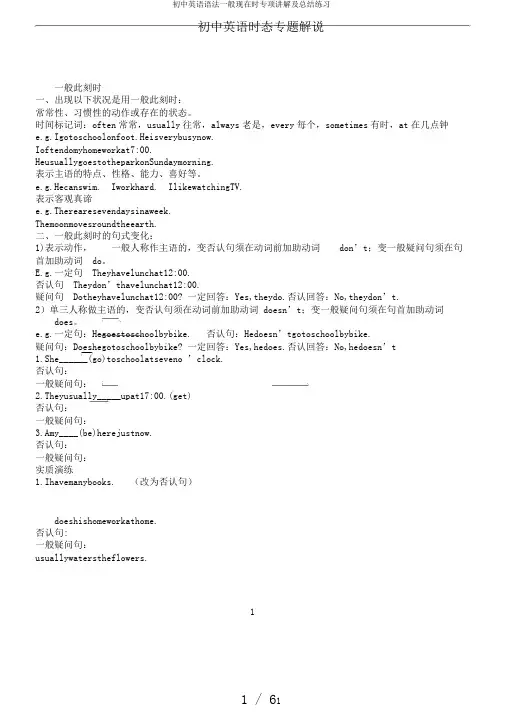
初中英语语法一般现在时专项讲解及总结练习初中英语时态专题解说一般此刻时一、出现以下状况是用一般此刻时:常常性、习惯性的动作或存在的状态。
时间标记词:often常常,usually往常,always老是,every每个,sometimes有时,at在几点钟e.g.Igotoschoolonfoot.Heisverybusynow.Ioftendomyhomeworkat7:00.HeusuallygoestotheparkonSundaymorning.表示主语的特点、性格、能力、喜好等。
e.g.Hecanswim. Iworkhard. IlikewatchingTV.表示客观真谛e.g.Therearesevendaysinaweek.Themoonmovesroundtheearth.二、一般此刻时的句式变化:1)表示动作,一般人称作主语的,变否认句须在动词前加助动词don’t;变一般疑问句须在句首加助动词do。
E.g.一定句Theyhavelunchat12:00.否认句Theydon’thavelunchat12:00.疑问句Dotheyhavelunchat12:00? 一定回答:Yes,theydo.否认回答:No,theydon’t.2)单三人称做主语的,变否认句须在动词前加助动词doesn’t;变一般疑问句须在句首加助动词does。
e.g.一定句:Hegoestoschoolbybike. 否认句:Hedoesn’tgotoschoolbybike.疑问句:Doeshegotoschoolbybike? 一定回答:Yes,hedoes.否认回答:No,hedoesn’t1.She______(go)toschoolatseveno ’clock.否认句:一般疑问句:2.Theyusually_____upat17:00.(get)否认句:一般疑问句:3.Amy____(be)herejustnow.否认句:一般疑问句:实质演练1.Ihavemanybooks. (改为否认句)doeshishomeworkathome.否认句:一般疑问句:usuallywaterstheflowers.1初中英语时态专题解说否认句:一般疑问句YangusuallywashessomeclothesonSaturday. 否认句:5.IusuallyplayfootballonFridayafternoon. 否认句:一般疑问句:加强训练一、写出以下单词的第三人称单数形式1.work______ ____read__________clean__________write__________2.teach_____ _____wash__________guess__________watch__________3.go________ __do_________ __4.study_____ _____fly__________cry__________play__________5.have__________二.选择)1._____youhaveaboo k?A.DoB.AreC.Is D.Have)2.They_________onafarm .workingB.isworkC.working D.isworked)3.DoesPeterliketowatchTV?__________.A.Yes,helike B.No,hedoesn’tC.Yes,he’dlike D.No,helikes)4.Shedo esn’t__________herhomeworkintheafter noon.A.doingB.todoC.doesD.d o)5.How____________Mr.Brown___________toAmerica?A.do,goB.is,goC.does,go )6.Where’smy camera?I____________it.A.amnotfinding B.amnotseeing C.can’tfindD.can’tl ookat)7.How___________hegotowork?He___________toworkbybike.A.does;g oB.do;goesC.do;go D.does;goes)8.______youusuallylateforschool?No,_____ ________.A.Do;IamB.Does;notC.Are;I’mnotD.Are;Iaren’t)9._____she_____homeatsixeveryday?A.Is,leave B.Does,leave C.Is,leavesD.Does,le ft)10.Mr.Yang____________Englishthisterm .A.teachesour B.teachesus C.teachsusD.teachou r三.用所给动词的适合形式填空。
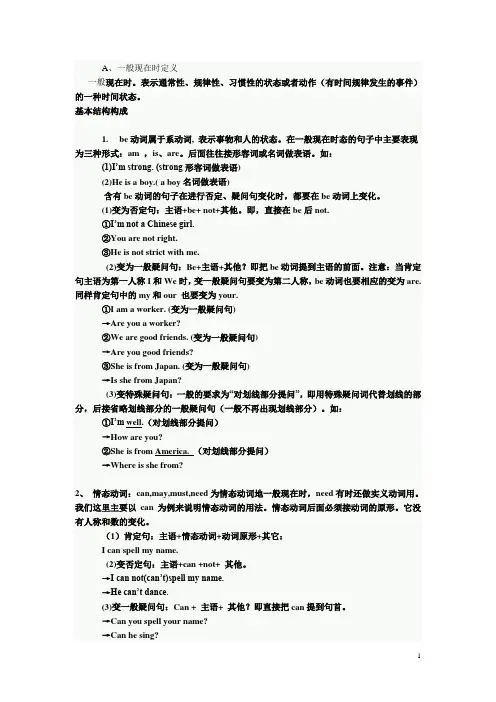
A、一般现在时定义一般现在时。
表示通常性、规律性、习惯性的状态或者动作(有时间规律发生的事件)的一种时间状态。
基本结构构成1. be动词属于系动词, 表示事物和人的状态。
在一般现在时态的句子中主要表现为三种形式:am ,is、are。
后面往往接形容词或名词做表语。
如:(1)I’m strong. (strong形容词做表语)(2)He is a boy.( a boy名词做表语)含有be动词的句子在进行否定、疑问句变化时,都要在be动词上变化。
(1)变为否定句:主语+be+ not+其他。
即,直接在be后not.①I’m not a Chinese girl.②You are not right.③He is not strict with me.(2)变为一般疑问句:Be+主语+其他?即把be动词提到主语的前面。
注意:当肯定句主语为第一人称I和We时,变一般疑问句要变为第二人称,be动词也要相应的变为are.同样肯定句中的my和our 也要变为your.①I am a worker. (变为一般疑问句)→Are you a worker?②We are good friends. (变为一般疑问句)→Are you good friends?③She is from Japan. (变为一般疑问句)→Is she from Japan?(3)变特殊疑问句:一般的要求为“对划线部分提问”,即用特殊疑问词代替划线的部分,后接省略划线部分的一般疑问句(一般不再出现划线部分)。
如:①I’m well.(对划线部分提问)→How are you?②She is from America. (对划线部分提问)→Where is she from?2、情态动词:can,may,must,need为情态动词地一般现在时,need有时还做实义动词用。
我们这里主要以can为例来说明情态动词的用法。
情态动词后面必须接动词的原形。
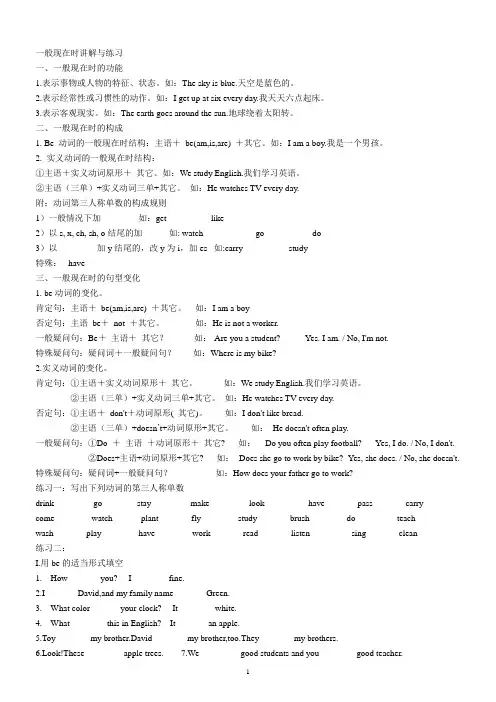
一般现在时讲解与练习一、一般现在时的功能1.表示事物或人物的特征、状态。
如:The sky is blue.天空是蓝色的。
2.表示经常性或习惯性的动作。
如:I get up at six every day.我天天六点起床。
3.表示客观现实。
如:The earth goes around the sun.地球绕着太阳转。
二、一般现在时的构成1. Be 动词的一般现在时结构:主语+be(am,is,are) +其它。
如:I am a boy.我是一个男孩。
2. 实义动词的一般现在时结构:①主语+实义动词原形+其它。
如:We study English.我们学习英语。
②主语(三单)+实义动词三单+其它。
如:He watches TV every day.附:动词第三人称单数的构成规则1)一般情况下加_______ 如:get----______ like--______2)以s, x, ch, sh, o结尾的加_____ 如: watch---________ go---_______ do---________3)以_________加y结尾的,改y为i,加es 如:carry---________ study---____________特殊:have---__________三、一般现在时的句型变化1. be动词的变化。
肯定句:主语+be(am,is,are) +其它。
如:I am a boy否定句:主语be+not +其它。
如:He is not a worker.一般疑问句:Be+主语+其它?如:-Are you a student? -Yes. I am. / No, I'm not.特殊疑问句:疑问词+一般疑问句?如:Where is my bike?2.实义动词的变化。
肯定句:①主语+实义动词原形+其它。
如:We study English.我们学习英语。
②主语(三单)+实义动词三单+其它。
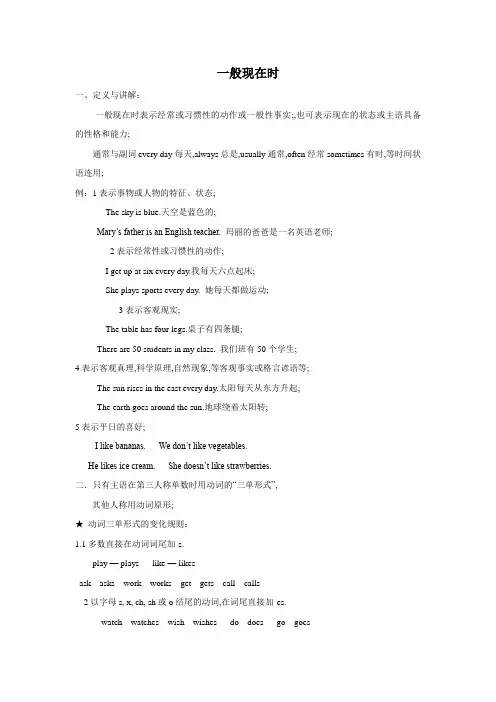
一般现在时一、定义与讲解:一般现在时表示经常或习惯性的动作或一般性事实;,也可表示现在的状态或主语具备的性格和能力;通常与副词every day每天,always总是,usually通常,often经常sometimes有时,等时间状语连用;例:1表示事物或人物的特征、状态;The sky is blue.天空是蓝色的;Mary’s father is an English teacher. 玛丽的爸爸是一名英语老师;2表示经常性或习惯性的动作;I get up at six every day.我每天六点起床;She plays sports every day. 她每天都做运动;3表示客观现实;The table has four legs.桌子有四条腿;There are 50 students in my class. 我们班有50个学生;4表示客观真理,科学原理,自然现象,等客观事实或格言谚语等;The sun rises in the east every day.太阳每天从东方升起;The earth goes around the sun.地球绕着太阳转;5表示平日的喜好;I like bananas. We don’t like vegetables.He likes ice cream. She doesn’t like strawberries.二.只有主语在第三人称单数时用动词的“三单形式”,其他人称用动词原形;★动词三单形式的变化规则:1.1多数直接在动词词尾加-s.play — plays like — likesask---asks work---works get---gets call---calls2以字母s, x, ch, sh或o结尾的动词,在词尾直接加-es.watch---watches wish---wishes do---does go---goes3以“辅音字母加- y”结尾的动词,要先变y为i再加-es.try---tries study---studies cry---cries fly---flies2.不规则变化:be---- is have----has三、一般现在时的句子转换:1变一般疑问句:当句子中有be动词或情态动词时,则把be动词或情态动词can,could等提到主语的前面,口诀:一调二变三问号;2变否定句:在be动词或情态动词后面直接加not变成否定句. be后not莫忘记例:①陈述句:She is my sister..疑问句→ Is she your sister Yes, I am./ No, I’m not.否定句→ She is not my si ster.②陈述句:I can play soccer.疑问句→ Can you play soccer Yes,Ican./ No, I can’t.否定句→ I can not /can’t play soccer.★注意:对一般疑问句的回答:一般用什么问就用什么来回答;但以下例外:Is this a pencil Yes , it is./ No, it isn’t.Is that your backpack Yes , it is./ No, it isn’t.Are these your parents Yes, they’re./ No, they aren’t.Are those Jim’s brothers Yes,they’re./ No, they aren’t.3当句子中没有be动词,也没有情态动词时,变一般疑问句时,在主语前加助动词do I, we, you,以及复数, does第三人称单数she,he,it等变成问句;4变否定句时,在主语后谓语动词前加助动词don’t, doesn’t变成否定句,切记:助动词后的动词则还原成动词原形;例:①陈述句:We get up起床at 7:00 every morning.疑问句→Do you get up at 7:00 every morning否定句→We don’t get up at 7:00 every morning.②陈述句:She has a brother.疑问句→ Does she have a brother否定句→ She doesn’t have a brother.※在一般现在时中,当主语是第三人称单数时,谓语动词要用第三人称单数形式,即常在动词原形后加-s或-es;但有些同学们对于哪些主语是第三人称单数还不十分清楚,现归纳总结如下:一、人称代词he, she, it是第三人称单数;如:He likes watching TV. 他喜欢看电视;She has lunch at twelve. 她十二点吃午餐;二、单个人名、地名或称呼作主语;是第三人称单数;如:①Han Mei likes salsd . 韩梅喜欢萨拉;②Beijing is in China. 北京在中国;③Uncle Wang often plays volleyball.. 王叔叔经常打排球;三、单数可数名词或"this / that / the+单数可数名词"作主语时,是第三人称单数;如:②This book is yours. 这本书是你的;③That car is red. ④The cat is Lucy's. 这只猫是露茜的;四、不定代词someone, somebody, nobody, everything, something等及指示代词this, that作主语时,是第三人称单数;①Everyone is here. 大家到齐了;②There is a watch on the table. 桌上有块手表;③This is a pen. 这是一支钢笔;④That is an eraser.五、不可数名词作主语时为第三人称单数;如:①The milk牛奶is in the glass. 牛奶在玻璃杯里;②The bread is very small. 那面包很小;六、当数字或字母作主语时,看作第三人称单数;如:①"6" is a lucky number. "6"是个吉利数字;②"I" is a letter. "I"是个字母;一、按照要求改写句子1.This is my pencil 变一般疑问句your pencil 2. These red socks are Kate’s . 变一般疑问句socks Kate’s3. Mary does not have any books . 变肯定句some books .4. She likes theblack bag very much . 变为否定句5. I like apples. 用she改写句子6. It’s an English dictionary . 对画线部分提问. 7. He has hamburger and apples for dinner . 变一般疑问句二、用Be动词填空;1. you Li Fen No, not .2. Mr. green very busy Yes , he .3..This book very interesting .4. What class you in5. You and I good friends .6. The basketball club fun .三.用所给动词的适当形式填空;1. Lin Tao like his ruler .2. Let’s have ice cream .3. Let’s play tennis4. He like English.5. Nice meet you6. I need some fruits.一般现在时用法专练:一、写出下列动词的第三人称单数形式;have like drink _____ go _____ stay ____ study___ _ teach_____make ______look ______have____ come_____ watch______ plant_____ fly _____ do_____ 二、用括号内动词的适当形式填空;1. He often ________have dinner at home.2. Daniel and Tommy _______be in Class One.3. We_______not watch TV on Monday.4. Nick ____ ___not go to the zoo on Sunday.5. ______ they ________like pears6. _______ your parents _______have eggs every day7. There ________be some water in the bottle.18. Mike _______like cooking.9. They _______have the same hobby.10. Liu Tao ______ _do not like PE.11. This boy often _______watch TV in the evening.五、改错划出错误的地方,将正确的写在横线上1. Is your brother speak English __________________2. Does he likes going fishing ________________3. He likes play games after class. _______________ __4. Mr. Wu teachs us English. _______________5. She don’t do her homework on Sundays. _____________一般现在时态句型转换1.This is a white key. 对画线部分进行提问2.B en’s bag is yellow and red . 对画线部分进行提问3.Her name is Gina. 对画线部分进行提问4.My phone number is 673-8220. 对画线部分进行提问5.The boy’s name is Jack. 对画线部分进行提问6.The picture is on the wall. 对画线部分进行提问7.Your baseball is under the chair. 对画线部分进行提问8.His book is on the desk. 对画线部分进行提问9.Some balls are in the dresser. 对画线部分进行提问10.My computer is on my desk. 对画线部分进行提问11.He is Johnny. 改为一般疑问句12.These are his parents. 改为一般疑问句13.This is my sister. 改为一般疑问句baseball is under the bed. 改为一般疑问句key is on the bed. 改为一般疑问句has a tennis racket. 改为一般疑问句have some baseball bats. 改为一般疑问句has many things to do today. 改为一般疑问句like hamburgers . 改为一般疑问句have a TV. 改为一般疑问句are Tina. 改为否定句are my brothers. 改为否定句books are on the bookcase. 改为否定句books are under the desk. 改为否定句has a computer game. 改为否定句have a big TV in our house. 改为否定句has some money in her pocket. 改为否定句likes ice cream. 改为否定句to meet you 写出答语35.Is that a dictionary 改为复数句____________________________________________36These are photos. 改为单数句he your cousin 作肯定回答Linda his sister 作否定回答this a Chinese book 作否定回答are dictionaries. 改为单数句the CD on the sofa 作肯定回答the chairs next to the table 作否定回答is my book 改为复数句子are on the sofa . 改为单数句子现在进行时现在进行时是由“助动词beam, is, are+动词-ing”构成,表示说话者“此刻”或现阶段的行为;二、现在进行时的基本结构1.肯定句:主语+beam, is, are+现在分词+…… 例如:I am speaking with him on the phone. 我正和他通电话;He is playing tennis. 他正在打网球; My parents are dancing. 我父母正在跳舞;2.否定句:主语+be not+现在分词+…… 例如:I'm not studying. 我没在学习; She is not reading now. 现在她不是在看书;They are not writing. 他们没在写;3.一般疑问句:Be动词+主语+现在分词+…… 例如:1— Is she still helping Li Ling她还在帮助李玲吗— Yes, she is. 是的;/No, she isn't. 不,她没在帮李玲;2— Are you listening to music 你正在听音乐吗— Yes, I am. 是的;/No, I'm not. 不,我没有听音乐;4.特殊疑问句:特殊疑问词+be动词+主语+现在分词+…… 例如:— What are you studying 你正在学什么— I'm studying English. 我在学英语;— What is Mike doing 迈克在做什么----He is watching the football match. 他在看足球比赛;三、现在分词的变化规则1.一般在动词末尾加ing,如:think-thinking go-going2.以不发音字母e结尾的动词,先去掉e,再加ing,如:come-coming make-making3.以重读闭音节结尾的动词,中间只有一个元音字母,词尾只有一个辅音字母,应双写末尾的辅音字母,再加ing, 如:put-putting run-running四、现在进行时的基本用法1.表示此时此刻说话者正在进行的动作;例如:The teacher is talking with his students. 这位老师正在同他的学生交谈;What are you doing now 你现在干什么呢2.表示现阶段正在进行的动作,但此刻并不一定在进行; 例如:We are doing an experiment this week. 我们这个星期正在做一个实验;但说话时并不一定在做实验;3.现在进行时有时可用来表示将来发生的动作,这一用法常用于go, come, leave, start 等短暂性动词,后面也常用表示较近的将来时间状语如tomorrow, tonight, this morning/Friday 等,表示安排或计划好的事情;例如:We are leaving for Shanghai tomorrow. 我们明天启程去上海;4.现在进行时表示说话时正发生的或者正进行的动作;常与时间状语now , at the moment 等连用;It is raining hard now . Don't hurry .I am writing a letter . Will you please turn down the radioWatch out 当心It's falling .Look The clouds are gathering .Look at this picture of a busy railway station . A train is standing at one of the platforms ready to leave . Some of thepassengers are looking out of the windows watching the late-comers who are hurrying along looking for empty seats .We are busy at the moment . I'm selling cigarettes . My father is selling some sweets .5.表示按计划、安排将要发生的动作;We are going to Rome next week . Mr Black is leaving for Shanghai in a few days .Are you doing anything special tonight6.用在时间和条件状语从句中表达将来正进行的动作;I'll telephone you tomorrow while I'm waiting .I'll think about it while you are writing the report .When you are talking with him , take care not to mention this .If you are standing at the corner when I pass , I'll give you a lift into town .五、现在进行时的练习题按要求改写句子The boy is playing basketball.否定句:____________________________一般疑问句:_________________________ 肯定回答:__________________________ 否定回答:__________________________ 对“is playing basketball”提问:__________________________对“ The boy”提问:__________________________They are singing in the classroom.否定句:____________________________ 一般疑问句:_________________________ 肯定回答:__________________________ 否定回答:__________________________ 对“are singing ”提问:__________________________对“ in the classroom”提问:__________________________,the window ,open, now.用现在进行时连词成句._____________________birds are singing in the tree.就划线部分提问________________________,who,the window, cleaning连词成句______________________7. The children are playing games near the house.就划线部分提问_______________is closing the door now.改成否定句______________________are doing your homework.用“I”作主语改写句子______________________,the tree, sing, now, under.用现在进行时连词成句._____________________Young Pioneers are helping the old woman.改成一般疑问句______________________II.单项选择1.我在照看孩子.AI am looking after the baby. BI'm look aftering the baby.CI look am aftering the baby. DI looking after the baby.'s making ______a kite.AI, me BMy, my CMy, me DHis, his the woman ______ yellow your teacherAin Bputting on Cwearing DhavingThe twins _____their mother do the housework.Aare wanting Bhelp Care helping Dare looking the birds doing They are singing in a tree.AWho BWhat CHow DWhere she ____somethingAeat Beating Ceatting Deats7.你在干什么AWhat is you doing BWhat are you doCWhat are you doing DWhat do you doare you listening_____A/Bfor Cat Dto9.我正在听他说话.AI listening to him.BI'm listening to him.CI'm listen to him.DI'm listening him.are ____their clothes.Amakeing Bputting Cput away Dputting on III.用现在进行时完成下列句子:do sing an English song.mend mend a car.fly a kite Yes ,_______.sit in the boatask questionsplay games now.man______________work near the house now.。
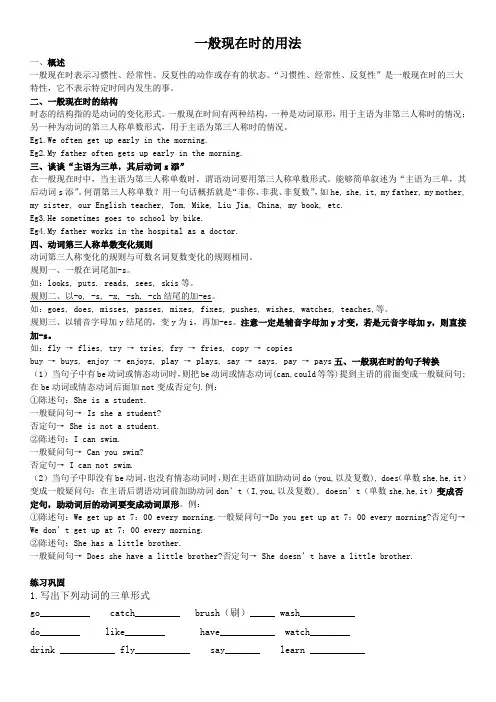
一般现在时的用法一、概述一般现在时表示习惯性、经常性、反复性的动作或存有的状态。
“习惯性、经常性、反复性”是一般现在时的三大特性,它不表示特定时间内发生的事。
二、一般现在时的结构时态的结构指的是动词的变化形式。
一般现在时间有两种结构,一种是动词原形,用于主语为非第三人称时的情况;另一种为动词的第三人称单数形式,用于主语为第三人称时的情况。
Eg1.We often get up early in the morning.Eg2.My father often gets up early in the morning.三、谈谈“主语为三单,其后动词s添”在一般现在时中,当主语为第三人称单数时,谓语动词要用第三人称单数形式。
能够简单叙述为“主语为三单,其后动词s添”。
何谓第三人称单数?用一句话概括就是“非你、非我、非复数”,如he, she, it, my father, my mother, my sister, our English teacher, Tom, Mike, Liu Jia, China, my book, etc.Eg3.He sometimes goes to school by bike.Eg4.My father works in the hospital as a doctor.四、动词第三人称单数变化规则动词第三人称变化的规则与可数名词复数变化的规则相同。
规则一、一般在词尾加-s。
如:looks, puts. reads, sees, skis等。
规则二、以-o, -s, -x, -sh, -ch结尾的加-es。
如:goes, does, misses, passes, mixes, fixes, pushes, wishes, watches, teaches,等。
规则三、以辅音字母加y结尾的,变y为i,再加-es。
注意一定是辅音字母加y才变,若是元音字母加y,则直接加-s。
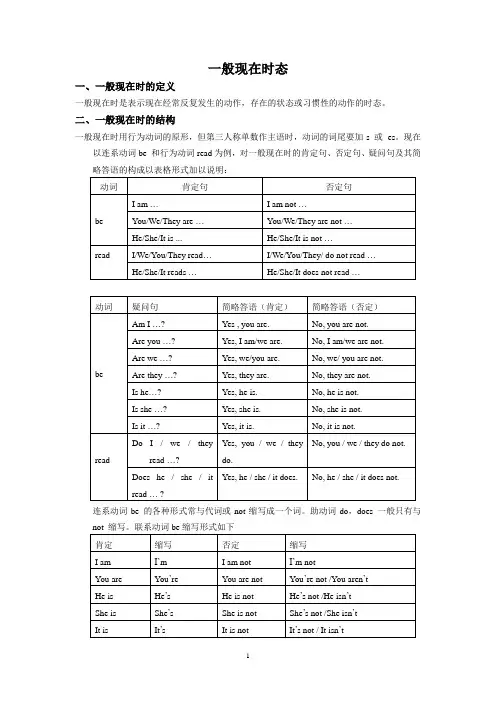
一般现在时态一、一般现在时的定义一般现在时是表示现在经常反复发生的动作,存在的状态或习惯性的动作的时态。
二、一般现在时的结构一般现在时用行为动词的原形,但第三人称单数作主语时,动词的词尾要加-s 或- es。
现在以连系动词be 和行为动词read为例,对一般现在时的肯定句、否定句、疑问句及其简略答语的构成以表格形式加以说明:连系动词be 的各种形式常与代词或not缩写成一个词。
助动词do,does 一般只有与动词do not 的缩写形式为don’t,does not 的缩写形式为doesn’t。
二、动词加-s 或-es (动词第三人称单数)当主语是第三人称单数时,谓语动词需加-s 或-es1.一般在词尾加–s例:work—works leave --- leaves swim --- swims2.以字母s,x,ch,sh 或o结尾的词加-es例:pass--- passes fix ---fixes teach --- teaches do--- does3.以辅音字母加y结尾的词,先变y为i再加-es例:study --- studies carry --- carries fly --- flies cry --- cries三、一般现在时的用法1.表示经常或习惯性的动作。
常与often(经常), always(总是), sometimes(有时), every day(每天), on Sundays/Mondays 等表示频度的时间状语连用。
一般现在时的时间状语有:today, often, sometimes, always, usually, every day ( week, month, year,…) , this year, once a week ( month, year,…) 一周(月,年)一次例句:I get up at 6 o’clock every day.He often goes to school by bike.2.表示客观事实,普遍真理。
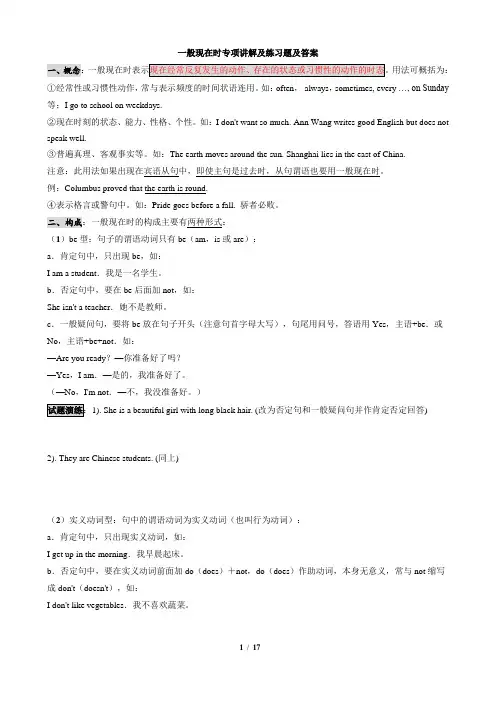
一般现在时专项讲解及练习题及答案一、概念:用法可概括为:①经常性或习惯性动作,常与表示频度的时间状语连用。
如:often,always,sometimes, every …, on Sunday 等;I go to school on weekdays.②现在时刻的状态、能力、性格、个性。
如:I don't want so much. Ann Wang writes good English but does not speak well.③普遍真理、客观事实等。
如:The earth moves around the sun. Shanghai lies in the east of China.注意:此用法如果出现在宾语从句中,即使主句是过去时,从句谓语也要用一般现在时。
例:Columbus proved that the earth is round.④表示格言或警句中。
如:Pride goes before a fall. 骄者必败。
二、构成:一般现在时的构成主要有两种形式:(1)be型:句子的谓语动词只有be(am,is或are):a.肯定句中,只出现be,如:I am a student.我是一名学生。
b.否定句中,要在be后面加not,如:She isn't a teacher.她不是教师。
c.一般疑问句,要将be放在句子开头(注意句首字母大写),句尾用问号,答语用Yes,主语+be.或No,主语+be+not.如:—Are you ready?—你准备好了吗?—Yes,I am.—是的,我准备好了。
(—No,I'm not.—不,我没准备好。
)1). She is a beautiful girl with long black hair. (改为否定句和一般疑问句并作肯定否定回答)2). They are Chinese students. (同上)(2)实义动词型:句中的谓语动词为实义动词(也叫行为动词):a.肯定句中,只出现实义动词,如:I get up in the morning.我早晨起床。
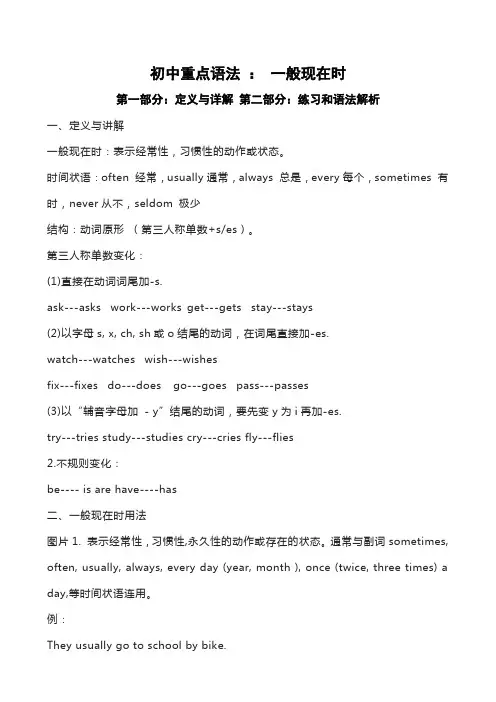
初中重点语法:一般现在时第一部分:定义与详解第二部分:练习和语法解析一、定义与讲解一般现在时:表示经常性,习惯性的动作或状态。
时间状语:often 经常,usually通常,always 总是,every每个,sometimes 有时,never从不,seldom 极少结构:动词原形(第三人称单数+s/es)。
第三人称单数变化:(1)直接在动词词尾加-s.ask---asks work---works get---gets stay---stays(2)以字母s, x, ch, sh或o结尾的动词,在词尾直接加-es.watch---watches wish---wishesfix---fixes do---does go---goes pass---passes(3)以“辅音字母加- y”结尾的动词,要先变y为i再加-es.try---tries study---studies cry---cries fly---flies2.不规则变化:be---- is are have----has二、一般现在时用法图片1. 表示经常性,习惯性,永久性的动作或存在的状态。
通常与副词sometimes, often, usually, always, every day (year, month ), once (twice, three times) a day,等时间状语连用。
例:They usually go to school by bike.I take the medicine three times a day.She helps her mother once a week.Mary’s father is a policeman.There are 50 students in my class.2. 表示客观真理,科学原理,自然现象,等客观事实或格言,谚语等。
例:The sun rises in the east and sets in the west every day.Tomorrow is Tuesday.三、一般现在时的句型转换(1)当句子中有be动词或情态动词时,则把be动词或情态动词(can,could等等)提到主语的前面变成疑问句;在be动词或情态动词后面加not变成否定句.例:①陈述句:She is a student.疑问句→Is she a student?否定句→She is not a student.②陈述句:I can swim.疑问句→Can you swim?否定句→I can not swim.(2) 当句子中即没有be动词,也没有情态动词时,则在主语前加助动词do (you,以及复数), does(单数she,he,it)变成问句;在主语后谓语动词前加助动词don’t(I,you,以及复数), doesn’t(单数she,he,it)变成否定句,助动词后的动词要变成动词原形。
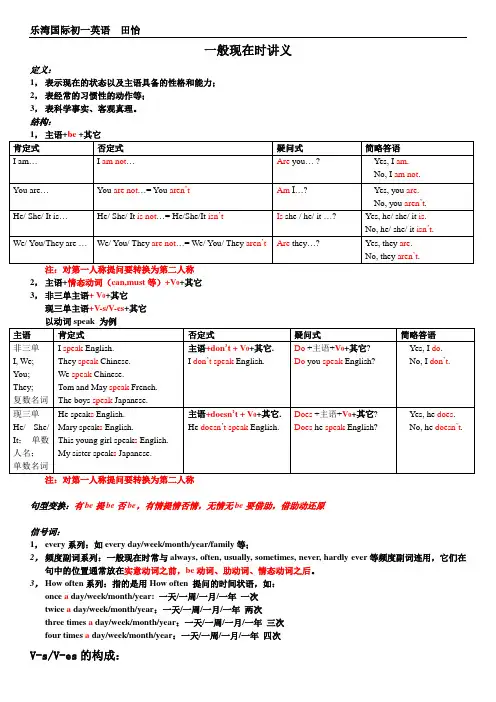
一般现在时讲义定义:1, 表示现在的状态以及主语具备的性格和能力; 2, 表经常的习惯性的动作等; 3, 表科学事实、客观真理。
结构:注:对第一人称提问要转换为第二人称 2, 主语+情态动词(can,must 等)+V 0+其它 3,非三单主语+ V 0+其它现三单主语+V-s/V-es +其它 以动词speak 为例句型变换:有be 提be 否be ,有情提情否情,无情无be 要借助,借助动还原信号词:1, every 系列:如every day/week/month/year/family 等;2, 频度副词系列:一般现在时常与always, often, usually, sometimes, never, hardly ever 等频度副词连用,它们在句中的位置通常放在实意动词之前,be 动词、助动词、情态动词之后。
3, How often 系列:指的是用How often 提问的时间状语,如:once a day/week/month/year: 一天/一周/一月/一年 一次 twice a day/week/month/year :一天/一周/一月/一年 两次three times a day/week/month/year :一天/一周/一月/一年 三次 four times a day/week/month/year :一天/一周/一月/一年 四次V-s/V-es 的构成:当主语是第三人称单数时,动词形式需下列几种变化:1 一般动词在词尾加s: helps, makes, leaves, knows, plays2 以-s, -x, -ch, -sh, -o字母结尾的动词加es: teaches, goes, washes. fixes3 以辅音字母加y结尾的动词,变y为i, 加es: flies, studies, cries4 不规则变化:do—does, go—goes, have--has一般现在时专项练习一、写出下列单词第三人称单数形式:catch_______ guess______ thank______take_______ leave_______ love______watch_______ carry_______ see_______ answer_______ come_______ sleep______go_______ eat________ do______be ________ have ________ fly _______二、选择题:( )1.How many balloons _______ you have?A. areB. isC. doesD. do( )2. Where_____ Jim come from?A. isB. areC. doD. does( )3. ____your father______ to work on a train?A. Do; goB. Does; goesC. Does; goD. Do; goes( )4. ____ Jim____ any colored pencils? No, he ____. A. Is, has, has B. Do, have, hasC. Does, have, doesn'tD. Is, have, isn’t( )5. When________ your brother often do______ homework?A. do, /B. does, hisC. does, /D. do, his ( )6. I think Tom_______ a bike.A. there isB. haveC. doesD. has( )7. We_____ games or_____ kites every Sunday.A. playing, flyingB. play, flyC. do, makeD. take, mend( )8. I often _______ TV in the evening.A. watchB. seeC. watchesD. looks at ( )9. He usually____ his office at six in the afternoon. A. leave B. leaves C. to leave D. leaving ( )10. Li Lei_______ to eat an apple. Please give one to______.A. want, himB. wants, heC. want, hisD. wants, him ( )11. The twins _____ from Japan.A. isB. doC. comeD. comes( )12. ______ your father______ to work on a train?A. Do; goB. Does; goesC. Does; goD. Do; goes( )13.My friend ______not at home.A. isB. wereC. wasD. are( )14. Where ________ Mr. Smith live?A. isB. areC. doD. does( )15.Where ________Mr. Smith from?A. isB. comeC. doesD. are三、将下列句子变成否定句和一般疑问句:1. Jim usually has his dinner at 7:10.____________________________________________________________________________2. Lily and Lucy study English in the same class.____________________________________________________________________________3. Your football and basketball are under the bed.____________________________________________________________________________4. I sometimes go to the library at the weekend.____________________________________________________________________________5. We like our English teacher in WIS school.____________________________________________________________________________6. There are some books and a pen on the desk.____________________________________________________________________________7. She has a beautiful hat.____________________________________________________________________________8. I think Tom has a bike.____________________________________________________________________________9. We play games every Sundays.____________________________________________________________________________10. He always go to school at 7 o’clock in the morning.____________________________________________________________________________四、用动词的适当形式填空.1. The shop________(open) at 8 every morning.2. ________my sister __________(do) her homework every day?乐湾国际初一英语田怡3. The American _______( study) Chinese in our school.4. ________ the little girl _______(dress) herself?5. Where _______ Mr Smith________(live)?6. ________ they often_______(listen) to the radio?7. The children ______(work) very hard in the evening.8. She often_______(wash) her clothes.9. What ______ you usually ______(do) in the evening?10. Mrs. Smith always ________(stay) at home.11._________he __________(go) to school on Saturdays?12. He always ___________(go)to school at 7 in the morning.13.There________(be) a lot of cars on the street.14.We _________(stay) at my uncle’s for the weekend.15.She _________(have) four balloons.五、用下列词的正确形式填空。
一般现在时1概念引入在英语中,不同时间发生的动作和情况,要用不同的动词形式表示,这种不同的动词形式叫做动词的时态。
今天我们要学习的是一般现在时。
2用法讲解一、一般现在时的使用范围。
1. 表示现在的状态。
例如:I’m twelve. 我十二岁。
Where’s the schoolbag? 书包在哪里?2. 表示经常或者习惯性的动作。
例如:I have lunch every day. 我每天吃午饭。
Gina always asks: “Where is my schoolbag?”Gina总是问:“我的书包在哪里啊?”3. 表示客观事实或者存在。
例如: My sister is a teacher. 我姐姐是一位老师。
The earth turns around the sun. 地球绕着太阳转。
4. 表示主语所具备的性格和能力。
例如:She likes English very much. 她很喜欢英语。
Bill likes beef, but he doesn’t like chicken.比尔喜欢牛肉但是不喜欢鸡肉。
以上所述均是一般现在时的基本使用范围,除此之外一般现在时还有其他一些特殊用法,比如:一般现在时可以用在一些从句中表将来等,我们会在以后的学习中讲到。
注意:一般现在时态经常与often(经常),sometimes(有时),always(总是),usually (通常)等副词连用,也经常与every day(每天), every week(每周), every month (每月), every term(每学期), every year(每年), once a week(一周一次),twice a year(一年两次)等时间状语连用。
例如:She gets up early every morning. 她每天早上早起。
I go to see my grandmother every month. 我每个月都去看我的奶奶。
初一英语一般现在时态讲解一、定义与讲解一般现在时表示经常或习惯性的动作或一般性事实,也可表示现在的状态或主语具备的性格和能力。
通常与副词every day(每天),always(总是),usually(通常),often (经常)sometimes(有时),等时间状语连用。
例:(1)表示事物或人物的特征、状态。
The sky is blue.天空是蓝色的。
Mary’s father is an English teacher.玛丽的爸爸是一名英语老师。
(2)表示经常性或习惯性的动作。
I get up at six every day.我每天六点起床。
She plays sports every day. 她每天都做运动。
(3)表示客观现实。
The table has four legs.桌子有四条腿。
There are 50 students in my class. 我们班有50个学生。
(4)表示客观真理,科学原理,自然现象,等客观事实或格言谚语等。
The sun rises in the east every day.太阳每天从东方升起。
The earth goes around the sun.地球绕着太阳转。
(5)表示平日的喜好。
I like bananas. We don’t like vegetables.He likes ice cream. She doesn’t like strawberries.二.只有主语在第三人称单数时用动词的“三单形式”,其他人称用动词原形。
★动词三单形式的变化规则:1.规则变化:(1)多数直接在动词词尾加-s.play — plays like — likesask---asks work---works get---gets call---calls(2)以字母s, x, ch, sh或o结尾的动词,在词尾直接加-es.watch---watches wish---wishes do---does go---goes(3)以“辅音字母加 - y”结尾的动词,要先变y为i再加-es.try---tries study---studies cry---cries fly---flies 2.不规则变化:be---- is have----has三、一般现在时的句子转换:(1)变一般疑问句:当句子中有be动词或情态动词时,则把be动词或情态动词(can,could等)提到主语的前面,(口诀:一调二变三问号);(2)变否定句:在be动词或情态动词后面直接加not变成否定句. (be后not莫忘记) 例:①陈述句:She is my sister..疑问句→ Is she your sister? Yes, I am./ No, I’m not.否定句→ She is not my sister.②陈述句:I can play soccer.疑问句→ Can you play soccer? Yes,Ican./ No, I can’t.否定句→ I can not /can’t play soccer.★注意:对一般疑问句的回答:一般用什么问就用什么来回答。
一、一般现在时填空题1.Look! Miss Wang is coming here. She ________ (have) a book in her hand.【答案】has【解析】【详解】句意:看!王小姐要来了。
她手里拿着一本书。
陈述客观事实,句子用一般现在时,主语she是第三人称,动词用三单形式,故填has。
2.Tom often ____ kites with his classmates in the park at weekends. (fly)【答案】flies【解析】【详解】句意:汤姆周末经常和同学们在公园放风筝。
根据时间状语“often”可知,句子是一般现在时,主语是第三人称单数形式,故动词应用单三式flies。
故填flies。
3.Mike often ________ (play) the violin in the evening.【答案】plays【解析】【详解】句意:Mike经常在晚上拉小提琴。
根据“often”可知,此句为一般现在时;主语Mike为第三人称,因此谓语动词用单数。
故填plays。
4.His brother _____________ (work) at a hospital.【答案】works【解析】【详解】句意:他哥哥在一家医院工作。
根据时态是一般现在时,主语“His brother”是第三人称单数,所以用动词work“工作”的第三人称单数works,故填works。
5.Liu Xiang _____________ (run) very fast and I want to be a man like him.【答案】runs【解析】【详解】句意:刘翔跑得非常快,我想成为像他一样的人。
根据空缺处所在的句子是客观事实,所以时态是一般现在时,主语“Liu Xiang”是第三人称单数,所以用动词run“跑”的第三人称单数runs,故填runs。
6.“Where’s my schoolbag?” Gina always ________ (ask).【答案】asks【解析】【详解】句意:“我的书包在哪里?”吉娜总是问。
一般现在时讲解及练习(含答案)一、单项选择一般现在时1.If he ________ exercise, he______ healthy.A.not; will B.isn’t; won’t beC.doesn’t; will be D.doesn’t do; won’t be【答案】D【解析】【详解】考查if条件句中的时态。
句意:如果他不做运动,他就不会健康。
If条件句,如果主句用一般将来时态,则从句用一般现在时态,且句子主语是he,单数第三人称,故选D。
2.Whene ver you ______ a present, you’d better think about it from the receiver’s preference. A.bought B.buy C.will buy D.have bought【答案】B【解析】试题分析:句意:每当你买礼物的时候,你最好从接收方的偏好想一想。
whenever引导的让步状语从句,采用一般现在时表将来的用法。
故选B。
考点:考查动词的时态。
3.The Dragon Boat Festival ________ the beginning of the hottest season of the year.A.is marking B.marks C.will mark D.marked【答案】B【解析】试题分析:考查时态。
一般现在时表示经常性习惯性的行为。
本句中使用一般现在时端午节标志着一年中最热的季节的开始。
故B正确。
考点:考查时态4.That’s why I help brighten people’s days. If you ________, who’s to say that anothe r person will?A.didn’t B.don’tC.weren’t D.haven’t【答案】B【解析】【详解】考查条件状语从句中动词的时态。
一、一般现在时态1、一般现在时态的概念(1)、表示现在的状态(谓语多用系动词be)(2)、表示经常或习惯性的动作(谓语是do类动词)(3)、表示主语具备的性格和能力(谓语多是speak like enjoy)2、be (am is are)“是”,英语中最重要的一个系动词。
do类动词,又叫实义动词。
例如:have (有),play(玩,打)等。
3、一般现在时态的动词形式一般现在时态规定:系动词be用现在式am is are 三个形式。
do 类动词用原型或第三人称单数形式。
“原形动词+ s / es”构成“第三人称单数形式”,与单数名词变复数名词方法一样。
(1)、一般情况,动词后直接加s例如:brings 带来calls 打电话meets 遇见needs 需要(2)、以字母e结尾的动词,直接加s (读/ z /)例如:Likes 喜欢takes 带走(3)、以字母s x ch sh o结尾的动词,加es例如:does 做goes 走,去watches 观看(4)、以“辅音字母+ y”结尾的名词,变y为i,加es例如:stud y →studies 学习(思考:enjoy play have的第三人称单数形式是)4 、一般现在时态主语与谓语动词的搭配第一人称单数主语:I +am 或V原形he she itthis that第三人称单数主语单数名词不可数名词+ is ; V单三形式动词不定式动名词We you they复数主语these those + are ; V原形复数名词本块习题:用所给词的正确形式填空1、I _______ ( have ) a soccer ball .2、She ______ ( have ) two __________ ( pingpong—ball ) .3、He ______ ( play ) sports every day .4、We ______ ( speak ) English .5、Tom ______ ( call ) Jim every day .6、My daughter ______ ( like ) apples .7、His ______ ( friend ) knows English .8、The girl ______ ( study ) English sometimes .9、The _______ ( boy ) often watch TV .10、Her uncle ______ ( go ) home on foot 。
学习必备欢迎下载初一英语试题一般现在时1.含义:一般现在时表示经常、反复发生的动作或存在的状态.2. 用法:1)表示经常、反复发生的动作,现存的习惯或状态。
I am a teacher. We are Chinese.2)表示客观事实或普遍真理。
例如:There are seven days in a week. The earth goes around the sun. There are 365 days in a year . Taiwan is a part of China .3)表示安排或计划好的未来的动作,只限于go, come, leave, start, stay, return, arrive, begin, be 等动词。
例如:My train leaves at 6:30 this morning.- How long do you stay here? 4)表示主语的特征、性格、能力等。
Tom studies very hard. She is always ready to help others.3.时间状语一般现在时常和always, often, usually,never, seldom, every day, sometimes等表示时间的状语连用.4、行为动词在一般现在时中的用法:一般人称的谓语动词用原形.,但单数第三人称做主语时谓语动词词尾发生变化:即.动词词尾加-s;或.-es,动词遇到单数第三人称时的表示方法在一般现在时中, 当主语是单数第三人称时, 行为动词的形式是在词尾加-s 或–es具体方法如下:1.)一般情况下,直接加-seg. works,plays, rains, sees ,says 2.)以sh, ch, s, x 或o 结尾的词后–es eg. washes, teaches, fixes, does, goes3).以辅音字母加-y 结尾的,先把‘y’ 改成‘i’,再加-eseg. studies, flies, carries注意: 动词加-s 以后的读音.1.在[p] [t] [k] [f] 等清辅音后,发清辅音/s/ eg. helps , works, likes, hates ,laughs2.在浊辅音和元音后,发浊辅音/z/eg. drives, cleans, plays3.在[s] [z] [∫ ] [] []后,发/iz/rises, wishes, teaches, urges4.在[t] [d]后,发/ts/ /dz/eg. fits, sets, needs5. 其他情况下发[z]eg. plans, cries, shows5.否定形式:主语是第三人称单数,在行为动词前加doesn’t. 行为动词变为原形。
其余人称作主语时,都在行为动词前加don’tHe likes reading books.He doesn’t like reading books.I like playing football.I don’t like playing football.6.一般疑问句:主语是第三人称单数的,将助动词does提前,行为动词变为原形。
其余人称作主语,将助动词do提前,句号变问号。
主语I ,we 变you.1).He likes reading books.Does he like reading books?Yes, he does./ No, he doesn’t.2).I like playing football.Do you like playing football?Yes, I do./ No, I don’t.3).We like nice flowers.Do you like nice flowers?Yes, we do./No, we don’t.一般现在时:表示经常性的事情。
1、时间状语:often经常, usually通常, always总是,every每个,sometimes有时,at…在几点钟只有第三人称单数用动词三单,其余动词均用原形三单变化:1)、多数在动词后加s :play—plays like—likes2)、以s,x,sh,ch,o结尾的动词加es :go—goes wash—washes,catch-catches,do—does3)、以辅音字母加y结尾,把y改i再加es :fly—flies练一练1.We often_play__________(play) in the playground.2. He ____gets_____(get) up at six o’clock.3.___Do_______you ___brush______(brush) your teeth every morning?4. What does (do) he usually do (do) after school?5. Danny studies (study) English, Chinese, math, Science and Art at school.6. Mike sometimes __goes________(go) to the park with his sister.7. At eight at night, she __watches________(watch) TV with his parents.8.___Does_____ Mike___read_____(read) English every day?9. How many lessons __does_______yourclassmates___have_____(have) on Monday?10. What time __does_______his mother___do______(do) thehousework?改句子1.Do you often play football after school? (肯定回答)Yes , I do .2.I have some books. (改为否定句)I don’t have any books .I haven’t any books .3.Gao Shan’s sister likes playing table tennis (改为否定句)Gao Shan’s sister doesn’t like playing table tennis .4.She lives in a small town near New York. (改为一般疑问句)Does she live in a small town near New Year ?5.I watch TV every day. (改为一般疑问句)Do you watch TV every day ?6.David has a goal. (改为一般疑问句)Does David have a goal ?7.We have four lessons.(否定句)We don’t have four lessons .8.Nancy doesn’t run fast. (肯定句)Nancy runs fast .9.My dog runs fast. (否定句,一般疑问句)My dog doesn’t run fast .Does your dog run fast ?10.Mike has two letters for him. 一般疑问句,否定句:Does Mike have two letters for him ?Mike doesn’t have two letters for him .11.I usually play football on Friday afternoon. 否定句,一般疑问句I don’t usually play football on Friday afternoon .Do you usually play football on Friday afternoon ?12.Su Yang usually washes some clothes on Saturday.否定句:Su Yang usually doesn’t wash any clothes on Saturday .一般疑问句:Does Su Yang usually wash any clothes on Saturday ?划线提问: What does Su Yang usually do on Saturday ? What can you do ?13. Su Yang usually washes some clothes on Saturday.(划线提问)When does Su Yang usually wash any clothes ?14. Mingming usually waters the flowers every day否定句:Mingming doesn’t usually water the flowers every day . 一般疑问句:Does Mingming usually water the flowers every day ?划线提问Who usually waters the flowers every day ?Who has a friend in Australia?Who shares the computer with his parents ?15.Tom does his homework at home.否定句:Tom doesn’t do his homework at home .一般疑问句:Does Tom do his homework at home ?划线提问:Where does Tom do his homework ?I do my homework at seven every day .I don’t do /Do you do your homework at sevenMr. BlackMr. Black teaches (教授) us English this term(学期). He is a tall man. He likes wearing a white shirt and black trousers. He speaks English very well. We like his lessons(功课)very much.His home is near the school. Sometimes Mr. Black walks to his home. He has two little sons. They look the same. They often wear the same clothes(衣服). He loves to see them and play with them. Mr. Black calls(称呼) the two boys Da Mao and Xiao Mao.Tick or cross( T ) 21. Mr. Black is our English teacher.( F ) 22. Mr. Black is very short.( F ) 23. We don’t like his lessons.(F ) 24. Maybe Da Mao and Xiao Mao are twin brothers.(F ) 25. Mr. Black can speak Chinese well.Answer:26. Do the pupils like Mr. Black’s lessons? _Yes ,they do .________________________27. What does Black like to wear?He likes to wear a white shirt and black trousers .28. Is Mr. Black’s home far from the school? ___No,it isn’t .___________________29. Does Mr. Black like to play with his children? __Yes ,he does ._________________30. Does Mr. Black have a daughter(女儿)?__No,he doesn’t ._____________________A Clock and a WatchWe can tell time by a clock or by a watch. A clock is big; it is usually on the wall or on the table. A watch is small; we can put it in the pocket(衣袋)or wear it on the wrist(手腕)!A clock or a watch usually has a round face. It has two hands, a long(长的) one and a short(短的)one. Tom’s clock can speak and call him to get up every day. His watch has a picture of a lovely dog on the face. He likes it very much.Tick or cross( F ) 31. People tell time by a clock or by a watch.( T ) 32. We usually put a clock in the pocket or on the wrist.( F ) 33. On the round face of a clock there are some hands.( F ) 34. We usually put a watch on the wall.( F ) 35. Tom likes his clock very much.Fill in the blanks:36. We can tell the time by __a_______ __watch______ or by a clock.37. The __clock_______is bigger than a watch.38. A watch has two or three __hands_______ on its ___face______.39. People often put the clock ___on_______ ___the________wall_______.40. Tom’s _clock_______ can speak and call him to ___get _______up_______ every day.一般现在时态练习题一、写出下列动词第三人称单数的变化形式;be have come go stay teach write take study watch fly playis has comes goes stays teaches writes takes studies watches flies plays二、将下列句子变成否定式和疑问式:1.We go to evening school at night.We don’t go to evening school at night .Do you go to evening school at night ?2.My brother works in a radio factory.My brother doesn’t work in a radio factory . Does your brother work in a radio factory ? 3.Her name is Mei Ling.Her name isn’t Mei Ling .Is her name Mei Ling ?4.You have a red pencil.You don’t have a red pencil .Do you have a red pencil ?5.She has lunch at home.She doesn’t have lunch at home .Does she have lunch at home ?6.We have a meeting once a week.We don’t have a meeting once a week .Do you have a meeting once a week ?7. Maria goes to school on foot every day. Maria doesn’t go to school on foot every day . Does Maria go to school on foot every day ?8. My father smokes after meals.My father doesn’t smoke after meals .Does your father smoke after meals ?9. They always help people in need.They don’t always help people in need .Do they always help people in need ?10. I want to be a teacher.I don’t want to be a teacher .Do you want to be a teacher ?三、单项选择1. The Browns ________ a nice car and Brown's brother ________a nice jeep. 布朗夫妇The Zhangs=The Zhang familyA. have / haveB. has / hasC. have / hasD. has / have2. If their house ________ not like ours, what ________ it look like? Be like =look likeA. is / isB. is / doesC. does / doesD. does / is3. - ____ you think he will come? - If it ________ tomorrow, hewill not come.A. Do / rainsB. Are / rainsC. Do / will rainD. Are / will rain4. The little child ____ not even know that the moon ________ around the earth.A. do / moveB. do / movesC. does / movesD. did / moved5. Many a student ___ fond of films, but a good student seldom__to the cinema ()many students1. We often____play_______(play) in the playground.2. He _gets________(get) up at six o’clock.3. __Do________you __brush_______(brush) your teeth every morning?4. What does (do) he usually do (do) after school?He usually does (do) his (he) homework.5. Danny studies (study) English, Chinese, Maths, Science and Art at school.6. Mike sometimes __goes________ (go) to the park with his sister7. At eight at night, she ___watches_______ (watch) TV with his parents.8. __Does______ Mike__read______ (read) English every day?9. How many lessons ___does______ your classmate_have_______ (have) on Monday?10. What time __does_______his mother___do______(do) the housework?改句子1. Do you often play football after school? (肯定回答)Yes ,I do ___________________-2. I have many books. (改为否定句)I don’t have many books .___________________3. Gao Shan’s sister likes playing table tennis.(改为否定句)Gao Shan’s sister doesn’t like playing table tennis .(改为一般疑问句)Does Gao Shan’s sister like playing table tennis ?(否定回答) ____No, shedoesn’t__________________________________________________4. She lives in a small town(小镇)near New York.(改为否定句)She doesn’t live in a small town near New York .(改为一般疑问句)Does she live in a small town near New York ? ( 划线提问) Where does she live near New York ?5. He watches TV every day.(改为否定句)I don’t watch TV every day ._________(改为一般疑问句)Do you watch TV every day ?( 划线提问) What does he do every day ?6. Mingming usually waters the flowers every day(改为一般疑问句)Does Mingming usually water the flowers every day ?(作出肯定回答)Yes ,he does.(改为否定句)____Mingming doesn’t usually water the flowers every day .7. Su Yang usually washes some clothes on Saturday.否定句:Su Yang doesn’t usually wash any clothes on Saturday .一般疑问句: Does Su Yang usually wash any clothes on Saturday ?肯定回答: Yses ,he does .8. Tom does his homework at home.否定句: Tom doesn’t do his homework at home .一般疑问句: Does Tom do his homework at home ?肯定回答:Yes,he does .划线提问:What does Tom do at home ?9. I play badminton every week.变成一般疑问句:Do you play badminton every day ?否定回答:No,I don’t .变成否定句:_I don’t play badminton every day .10. Lily can cook meals.变一般疑问句: Can Lily cook meal ?作出肯定回答:Yes, she can .变否定句:Lily can’t cook meals .一用括号内动词的适当形式填空。